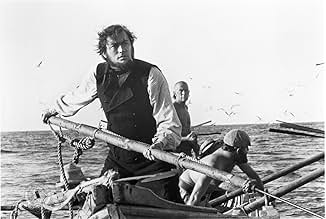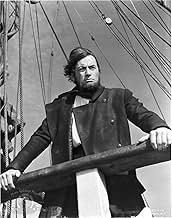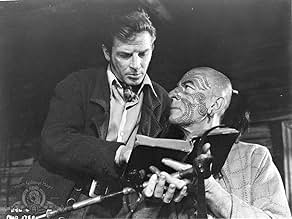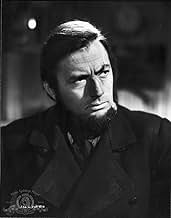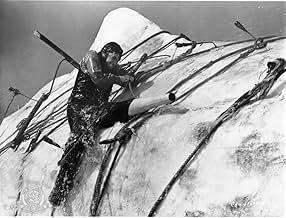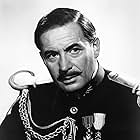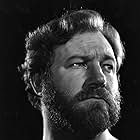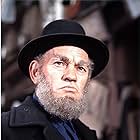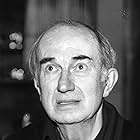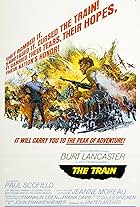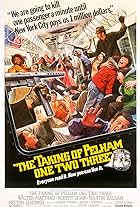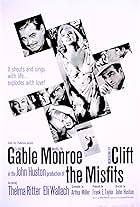The sole survivor of a lost whaling ship relates the tale of his captain's self-destructive obsession to hunt the white whale, Moby Dick.The sole survivor of a lost whaling ship relates the tale of his captain's self-destructive obsession to hunt the white whale, Moby Dick.The sole survivor of a lost whaling ship relates the tale of his captain's self-destructive obsession to hunt the white whale, Moby Dick.
- Awards
- 5 wins & 4 nominations
Friedrich von Ledebur
- Queequeg
- (as Friedrich Ledebur)
Tamba Allen
- Pip
- (uncredited)
Storyline
Did you know
- TriviaGregory Peck initially blamed the poor reviews of his performance on the script, which he felt contained "too much prose from the novel". However, he later acknowledged that he had been too young for the part at 38, since Captain Ahab was supposed to be an old man at the end of his career (Ahab's age, as implied in the book's chapter "The Symphony", is 58). He added, "The film required more. At the time, I didn't have more in me." and apologized to the screenwriters. Director John Huston admitted he didn't want Peck as Ahab, but had spoken very highly of him & was very satisfied with his performance.
- GoofsThe way the ship was moved away from the pier was incorrect. The crew is shown hauling a line from the pier. This would not make the ship move forward. To move a ship out of the harbor, it is therefore, necessary to provide something to pull against. A special anchor, called a kedging anchor, is carried as far from the ship as possible by the longboat and then dropped to the seabed. The remaining crew pull the ship out to it winding the line around the capstan or winch, and then it is hauled up and the process repeated as many times as necessary.
- Quotes
Captain Ahab: From hell's heart I stab at thee; for hate's sake I spit my last breath at thee. Ye damned whale.
- Crazy creditsThe film finishes with 'Finis' instead of the usual 'The End'.
- ConnectionsEdited into De 7 Dødssyndene: Latskap (2007)
Featured review
It would be impossible to make a movie that came up to the standard of the novel "Moby-Dick", but this film does a fine job of capturing some of the most important themes, and of telling a selection of the key parts of the story in an interesting way. It would be a temptation for any film-maker to put the focus on the action and the special effects, and thus ruin the heart of the book by downplaying its themes, as so many recent films have done with other classic material. Instead, John Huston's version concentrates on bringing out many of the complex internal and external conflicts of Captain Ahab, in sketching the crew members and their reactions to Ahab's monomania, and in portraying the atmosphere of frequent tedium, growing tension, and occasional dread aboard the 'Pequod'.
Richard Basehart's mild, pleasant demeanor makes Ishmael an appropriate mirror for the events and characters on the ship. Gregory Peck does rather well in the very challenging role of Ahab. Ahab is one of the most carefully-designed and demanding characters in literature, and lesser actors would simply be an embarrassment in the part. On screen, there is much to Ahab that just does not come across, and Peck's performance has to be judged with that in mind.
Leo Genn makes his scenes as Starbuck count, and several of the other crew members are portrayed well, albeit in much smaller parts. As Father Mapple, Orson Welles has only one scene, but it is an important one, in that it sets up some of the vital themes of the story ahead. Welles was an ideal choice, and his scene in the church is one scene that does come up to the high standard of Melville's novel.
While there may indeed be some areas in which this version falls short, and it's fair to point them out, it would be pretty difficult to improve on it in a cinema version of the story. And if taken on its own, it fits together well, making generally good choices as to what material would fit together and would work on screen, and in using the photography and settings to create the right atmosphere. For those who appreciate the depth of the original story, this has more than enough to make it worth watching.
Richard Basehart's mild, pleasant demeanor makes Ishmael an appropriate mirror for the events and characters on the ship. Gregory Peck does rather well in the very challenging role of Ahab. Ahab is one of the most carefully-designed and demanding characters in literature, and lesser actors would simply be an embarrassment in the part. On screen, there is much to Ahab that just does not come across, and Peck's performance has to be judged with that in mind.
Leo Genn makes his scenes as Starbuck count, and several of the other crew members are portrayed well, albeit in much smaller parts. As Father Mapple, Orson Welles has only one scene, but it is an important one, in that it sets up some of the vital themes of the story ahead. Welles was an ideal choice, and his scene in the church is one scene that does come up to the high standard of Melville's novel.
While there may indeed be some areas in which this version falls short, and it's fair to point them out, it would be pretty difficult to improve on it in a cinema version of the story. And if taken on its own, it fits together well, making generally good choices as to what material would fit together and would work on screen, and in using the photography and settings to create the right atmosphere. For those who appreciate the depth of the original story, this has more than enough to make it worth watching.
- Snow Leopard
- Sep 19, 2004
- Permalink
Details
- Release date
- Country of origin
- Language
- Also known as
- Herman Melville's Moby Dick
- Filming locations
- Youghal, County Cork, Ireland(harbour: New Bedford - departure of The Pequod)
- Production company
- See more company credits at IMDbPro
Box office
- Budget
- $4,500,000 (estimated)
- Gross worldwide
- $353
- Runtime1 hour 56 minutes
- Aspect ratio
- 1.66 : 1
Contribute to this page
Suggest an edit or add missing content






